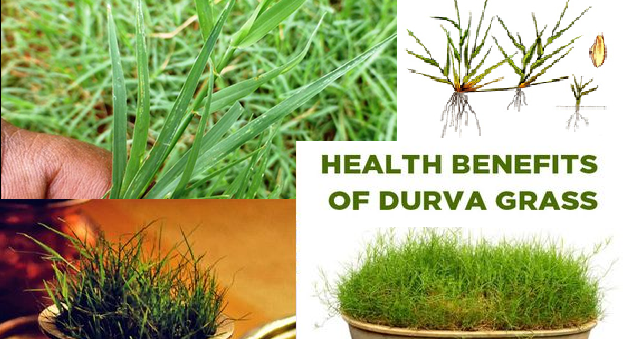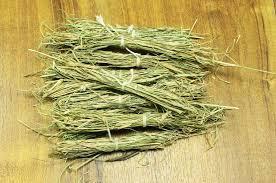DURVA GRASS
Contents
- Introduction
- Description
- Puranic Reference
- Ayurvedic Uses
- Significance
Introduction:
 Durva in Sanskrit means “which is cut or eaten by animals”. The English name is Bermuda grass. The scientific name is Cynodon dactylon. It belongs to the family of Poaceae. Other names of Durva grass are Bahama Grass, Devil’s grass, Couch Grass, Wire Grass, Indian Doab, Grama, or Scutch Grass. It is known as Doob (Hindi), Garike, Ambate- hullu (Kannada), Garika, Gerike, Harvali (Telugu), Durba (Bengali), Doorva, Haryali (Marathi), Karuka Pulli (Malayalam) and Arugam Pullu in Tamil.
Durva in Sanskrit means “which is cut or eaten by animals”. The English name is Bermuda grass. The scientific name is Cynodon dactylon. It belongs to the family of Poaceae. Other names of Durva grass are Bahama Grass, Devil’s grass, Couch Grass, Wire Grass, Indian Doab, Grama, or Scutch Grass. It is known as Doob (Hindi), Garike, Ambate- hullu (Kannada), Garika, Gerike, Harvali (Telugu), Durba (Bengali), Doorva, Haryali (Marathi), Karuka Pulli (Malayalam) and Arugam Pullu in Tamil.
Description of the grass
It is native to East Africa, Australia, Southern Europe and Asia. Durva is a perennial grass which grows in any type of soil. It penetrates about 2 meters in depth in soil and can survive in the toughest conditions. Durva is a creeping grass which spreads along the ground wherever the nodes touch the soil. The blades are greyish green in colour and grows up to 30 cms tall with rough edges. Flowers bloom on the blades with 3-7 fingers like spikes that originate from a single point. Each of the spikes is 1-3 cms long. Seeds are produced in these spikes and are wind pollinated. It grows well under direct sunlight. The spreading nature of the grass could be the reason for Durva to be known as the Devil’s grass.
Puranic Reference
There is a mention of Durva in the Rig Veda and Atharvana Veda. According to Bhavishya Purana, it is mentioned that Durva emerged from Lord Vishnu’s hair on His hand and thighs while He supported mount Mandara during the Samudra Manthana. (Lord Vishnu was supporting the mountain Mandara as a Turtle). According to Vamana Purana, Durva emerged from Vasuki’s tail- the snake which was used to churn the Ocean during Samudra Manthana.
Another reference is that, there once lived a demon, Analasur who terrified the world and the Devas. All the Devas approached Lord Shiva seeking protection from the demon. Lord Shiva asked all the Devas to approach Ganesha as; He would be able to put an end to the demon. All the Devas approached Ganesha and sought protection from the demon- Analasur.
 Lord Ganesha fought a fierce battle with the demon and swallowed him. This caused a lot of agony to Lord Ganesha. Then Lord Indra gave Him the moon to be worn on His forehead, so that He could have a cooling effect. Thus Lord Ganesha is also known as Balachandra. Lord Vishnu gave Him a lotus flower due to which He is also known as Padmapani. Lord Varuna showered rain on Him, but the suffering of Lord Ganesha did not ameliorate. It was then that 88,000 sages performed Archana to Lord Ganesha with 21 Durva grass each and then Lord Ganesha was cured of His stomach ailment. Thus Lord Ganesha is worshipped with 21 Durva Grass on Ganesha Chaturthi day.
Lord Ganesha fought a fierce battle with the demon and swallowed him. This caused a lot of agony to Lord Ganesha. Then Lord Indra gave Him the moon to be worn on His forehead, so that He could have a cooling effect. Thus Lord Ganesha is also known as Balachandra. Lord Vishnu gave Him a lotus flower due to which He is also known as Padmapani. Lord Varuna showered rain on Him, but the suffering of Lord Ganesha did not ameliorate. It was then that 88,000 sages performed Archana to Lord Ganesha with 21 Durva grass each and then Lord Ganesha was cured of His stomach ailment. Thus Lord Ganesha is worshipped with 21 Durva Grass on Ganesha Chaturthi day.
In Ramayana, Sita is said to have placed a blade of Durva between Herself and Ravana during her confinement in Ashoka Vana. She had warned Ravana not to cross the grass.
Ayurvedic Uses
Durva grass is a traditional herb used in the preparation of ayurvedic medicines since time immemorial. Durva grass is a storehouse of healthy nutrients like proteins, calcium, potassium, fibre, phosphorous, carotene, sitosterol. Durva has diuretic, antitoxic antifungal, hypoglycaemic, antilithic, hypotensive, coagulant, antibiotic, anticancer properties. Durva grass has anti microbial and anti viral properties thus used to improve the overall immunity of the body. It also helps the body to fight against various diseases. Durva grass contains cynodon dactylon protein fractions which enhance the immune modulatory activity that helps in optimising the immune system. Durva acts as a general tonic and aphrodisiac.
In Ayurveda, it is used to treat Vata Doshas. Its post digestive flavour is sweet. Its prabhava or special property is to prevent miscarriage.
Preparation of the Durva grass juice
A handful of durva grass washed and cleaned should be made into a fine paste by adding few drops of water. A spoon of the paste in a glass of warm water taken daily will act as an energiser and boost the overall immunity of the body. No food or drink for atleast 3 hours, after consuming the Durva juice.
The grass can be dried and powdered. The dried powder can be mixed with honey and taken or simply taken with water.
Durva is used to effective in the treatment of the following ailments:
- Skin disorders: Durva is rich in anti inflammatory, antiviral and antiseptic properties. It is used to treat various skin ailments like leprosy, scabies, itching, skin rashes and eczema. A paste of the Durva grass mixed with turmeric and applied on the affected area is a remedy for a host of skin related disorders.
- Blood Sugar levels: Durva grass has hypoglycaemic effect, thus used to reduce the blood sugar levels in the body. Regular consumption of the Durva grass along with neem leaves lowers the risk of associated effects of high blood sugar levels in the body.
- Insomnia and fatigue: It is a natural remedy for insomnia and for fatigue. Consumption of durva grass juice regularly relieves stress and strengthens the nervous system.
- Blood Purifier: Durva grass is a natural blood purifier and maintains the alkalinity of blood. Juice of Durva taken every morning on an empty stomach is said to detoxify the body.
- Obesity and Cholestrol: Regular consumption of Durva grass juice helps in reducing weight and the cholesterol levels. It also enhances the cardiac function. It acts as an anti arrhythmic agent.
- Conjunctivitis: A few drops of the juice is dropped in the eyes to treat conjunctivitis.
- Anaemia: Durva contains 65% of chlorophyll, thus is a natural remedy for treating anaemia as it increases the red blood cells which will improve the Haemoglobin levels in the body.
- Digestion: Regular consumption of Durva grass is a natural detoxifier and reduces acidity. It is also effective in treating constipation.
- Women’s problems: A spoon of the Durva grass juice taken along with yoghurt is effective in treating Urinary tract infection and vaginal discharge in women. Durva strengthens the uterus and is highly beneficial for curing abortion. It is a natural remedy for PCOS (poly cystic ovarian syndrome) and boosts production of prolactin hormone thereby aiding in lactation. It is very effective in treating excessive blood loss during menstruation, nosebleed or blood loss during injuries.
- Dental problems and ulcers: Durva grass is rich in flavonoids that helps fight against ulcers. It is effective in treating cold and reduces the phlegm in the lungs. It is used to treat bleeding gums and bad breath.
Significance
Durva symbolises purity. It also symbolises rebirth and prosperity, fertility as once the blades of grass are plucked, new grass grows in its place. Rings are made out of the dried grass and worn at the time of commencing any ceremony symbolising purity. The ring made out of the Durva is first sanctified by dipping it in holy water and then worn on the ring finger on the right hand. It is believed that the Durva grass purifies everything that it comes in contact with.

Lord Ganesha is offered 21 blades of the Durva grass while reciting “ Om Gajananaya Namaha, Durva Patram Samarpayami”
Lord Ganesha is offered three or five leaflets of Durva. The middle leaflet is said to please Lord Ganesha while, the other two leaflets please Goddess Parvati and Lord Shiva.
Durva is considered sacred as Lord Brahma is said to reside at its roots, Lord Vishnu in the middle and Lord Shiva at the tip.
Growing the grass helps prevent soil erosion.
An annual ceremony known as Durva Ashtami is celebrated during the Bhadra Pada) Krisna Ashtami (8th day of the waning moon in September- October). On this day Durva is offered to the Lord with its tip facing the east. It is believed that by observing this ceremony immortality and blessedness for ten ancestors is secured.
http://www.thehealthsite.com/diseases-conditions/top-9-health-benefits-of-durva-grass/
http://www.itslife.in/gardening/wild-plant-and-flowers/bermuda-grass-durva-grass-cynodon-dactylon
http://blog.nirogam.com/bermuda-grass-the-holy-weed-wonder/
http://viprayuva.org/joomla/index.php/articles/188-divine-herb-durva-grass
http://rxayurveda.com/rx-ayurveda-yoga-plants-herbs-durva-grass/
http://naturalhomeremedies.co/bermuda%20grass.html
http://en.wikipedia.org/wiki/Cynodon_dactylon
http://vedicgoddess.weebly.com/bhakti-masala-blog/durva-is-sacred-grassby-yogi-ananda-saraswathi
http://vidyaonline.org/dl/shaktigupta.pdf


